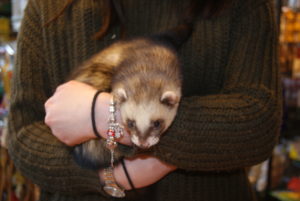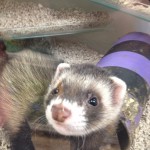Last week we unfortunately had a serious issue with some of our breeding ferrets, Fatso, The Cow and The Little One – that’s just what they have become known as, what can I say? I just thought I would do a blog so anyone else keeping ferrets can recognise the symptoms and it will hopefully help them get prompt treatment.
The main infection turned out to be Giardia. Giardia is a protozoan parasite that can infect the gut of most mammals. The symptoms are quite severe and include violent and often bloody diarrhoea, excessive gas and bloating, painful stomach and abdominal cramps and nausea. The infection also causes the villi in the gut (microscopic “finger” projections that significantly increase the surface area of the nutrient absorbing gut lining) leading to poor nutrient uptake and lactose intolerance (although that’s not relevant in our case as ferrets should not be fed milk anyway). Without treatment of the symptoms, after infection and recovery, the parasite can remain in the gut and the animal can become a carrier. Some symptoms, such as lactose intolerance, can persist.
The symptoms of Giardia infection are quite severe and as we found out last week, can have a very sudden onset. I went out to our ferret compound on Saturday to feed and water them and to check on their bedding status as they have a tendency to empty it out all over the exercise area and they were fine; trying to escape as I refreshed the food as usual, tucking into it straight away etc. On Sunday they were still asleep when I went out in the morning (not unusual) so I didn’t see them. On Monday Albert went to clean them out and it was like a scene from a horror film. Three very sick ferrets, out in the open, barely able to lift their heads (one was better than the others but even she was obviously in a bad way) and covered in blood and faeces and only barely able to drag themselves along without the use of their back legs. When I saw them I honestly thought I was going to lose all three.
Albert cleaned them up and gave them a bath (they were filthy) and dried them and I booked them straight into the vets. A sample was taken from each of them, they received rehydration treatment (intravenously) and an immediate course of antibiotics was started as a precaution, whilst we waited for the test results. I brought them to the shop, to keep a closer eye on them in our isolation area upstairs. The first day they were not capable of eating or drinking (no energy at all) and again I thought they would not make it (I later found out the vet thought the same). The only upside was that it was easy to administer an oral medicine to them that, I subsequently found out, they really did not like.
The next day the vet called me with preliminary results. They had two gut infections Clostridium (a bacterial infection, often carried in low numbers in the gut with no symptoms) and Giardia. The vet supposed the Clostridium to be secondary to the Giardia infection. Luckily I was able to report that the antibiotics had begun to work almost straight away and there was a marked improvement (although they were still very ill). They were at least now drinking unaided. We suspect this was due to the reduction in Clostridium numbers from the anti biotics. The vet prescribed an alternative medication (metronidazole) now that we knew Giadia was involved and this was started immediately.
They have been receiving treatment for a week now and have pretty much fully recovered. We have to complete the course for another week. After another fortnight we will take a stool sample and have it tested. If Giardia is still present then it’s another two week course of treatment. I hope this is not necessary because they don’t like the taste of the medicine and now they are back to their normal selves it’s difficult to administer (I am covered in splashes of medicine as I type, where they have all shaken their heads to try to spit it out ).
Of course, an important factor with Giardia is that it infects humans as well (zoonotic). Hygiene and bio security is very important at all times whilst keeping any animal but particularly when they are sick. We always wash our hands and F10 everything (including our clothing) every time we handle them. I have had salmonella (which has similar symptoms) and I don’t want to go through something like that again.
This just leaves how they caught the infection in the first place. Our ferrets are well looked after and kept very clean. I have had these ones for a few years without any issues so it is unlikely one of them was a carrier. The likely culprit is probably either a mouse (we have had them come in the garden after wild bird seed) or a rat (not seen one of these around the garden before but it is a possibility). I am afraid if little Jerry or Roland is the culprit, he is going to get his just desserts. The thought of one (or both) of the dogs getting explosive, bloody diarrhoea just does not bear thinking about!
The Angell Pets Team



